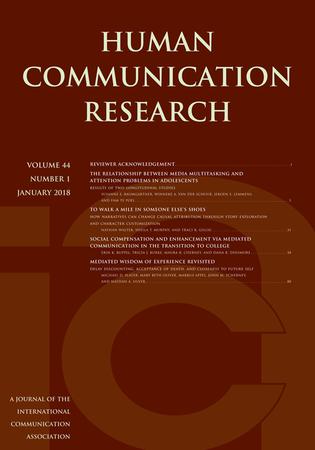大学约会者中的动荡、框架和规划:在一项二元实验室研究中检验关系动荡理论
IF 3.3
1区 文学
Q1 COMMUNICATION
引用次数: 0
摘要
本研究运用关系动荡理论(RTT),考察了约会伴侣的关系质量如何预测规划对话中的认知和交流。在一项基于实验室的研究中,大学约会伴侣(n = 71 对不同性别的情侣)评估了他们的关系动荡,参加了两个规划活动,然后报告了他们对每个活动的合作规划和关系框架的看法。外部观察者对对话中的合作规划、支配地位和附属行为进行评分。我们假设,在 RTT 之后,关系动荡会导致协作规划减少,参与的关系框架更加消极。重复测量的行为者-伙伴相互依存模型表明,参与者的感知和外界对变量的观察会产生不同的影响。研究结果为 RTT 相对未经验证的命题提供了支持,表明不同性别约会伴侣的经历可能存在性别差异,并重申了约会伴侣间关系交流的复杂性。本文章由计算机程序翻译,如有差异,请以英文原文为准。
Turbulence, framing, and planning among college daters: testing relational turbulence theory in a dyadic, lab study
Engaging relational turbulence theory (RTT), this study examined how dating partners’ relationship quality predicted cognitions and communication during planning conversations. In a lab-based study, college dating partners (n = 71 different gender couples) assessed their relational turbulence, participated in two planning activities, and then reported their perceptions of collaborative planning and relational framing for each activity. Outside observers rated the conversations for collaborative planning, dominance, and affiliation behaviors. Following RTT, we hypothesized that relational turbulence would lead to decreases in collaborative planning and engagement in more negative relational frames. Actor–partner interdependence models with repeated measures indicated differing effects on participant perception and outsider observations of the variables. Results provide support for RTT’s relatively untested propositions, suggest potential gender differences among different gender dating partners’ experiences, and reiterate the complexity of relational communication among dating partners.
求助全文
通过发布文献求助,成功后即可免费获取论文全文。
去求助
来源期刊

Human Communication Research
COMMUNICATION-
CiteScore
8.20
自引率
2.00%
发文量
28
期刊介绍:
Human Communication Research is one of the official journals of the prestigious International Communication Association and concentrates on presenting the best empirical work in the area of human communication. It is a top-ranked communication studies journal and one of the top ten journals in the field of human communication. Major topic areas for the journal include language and social interaction, nonverbal communication, interpersonal communication, organizational communication and new technologies, mass communication, health communication, intercultural communication, and developmental issues in communication.
 求助内容:
求助内容: 应助结果提醒方式:
应助结果提醒方式:


